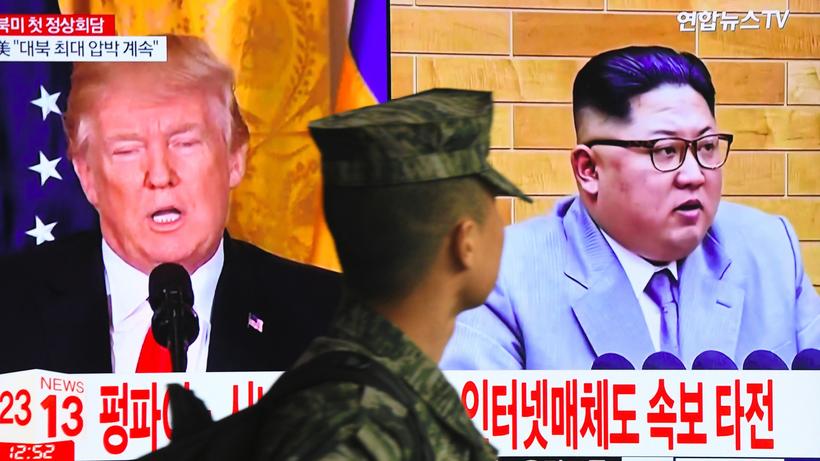
U.S. President Trump may view a summit with North Korea’s dictator as his own success, but he has not yet obtained anything. The disarmament agreement cannot be settled between two parties.
At the moment, the invitation from the North Korean ruler Kim Jong Un, which U.S. President Donald Trump wants to accept, is a diplomatic coup of the highest order: The two eccentric heads of state want to meet each other at some point in the coming weeks. Kim has supposedly declared himself willing to carry out nuclear disarmament, and nuclear and missile tests should be temporarily suspended. It sounds like the kind of deal that only needs the right man, as Trump so frequently claims in reference to himself, because nobody else could make such a thing possible.
Nothing speaks against an attempt to negotiate with North Korea. On the contrary, everything speaks in its favor, as the alternative method to rein in Kim’s nuclear ambition would lead to a war that nobody can win. There is no military option that would stop the dictator. A targeted pre-emptive strike, often referred to as a “bloody nose,” would not succeed. Kim’s reaction would be unpredictable, or, more precisely, it would be predictably violent enough to discourage the attempt. The regime in Pyongyang does not allow itself to be scared off.
At any rate, until recently, Trump was certain that nothing else would do the trick. He claimed that 25 years of attempting to talk to North Korea has resulted in the U.S looking like “fools.” The president does not seem to value diplomacy at all. He has alternated between swearing at Kim on Twitter and using that same medium to discredit Secretary of State Rex Tillerson’s efforts to keep the possibility of dialogue open. Trump’s threats have left no room for doubt: He has thought that “totally destroy[ing]” North Korea was an appropriate measure, albeit a last resort.
One could therefore get the impression that it was Trump’s tough approach that steered the immovable dictator in the right direction. That is how the president is telling it anyway. After all, it is not completely wrong to assume that diplomacy can only have a hope of success as long as one expects both positive and negative consequences. However, it is not clear what exactly these two powers expect to negotiate. Or, more precisely, what the U.S. has to offer.
Kim Is Not the Small Crazy Man
It may also look like victory belongs to Kim for now. Trump agreeing to a summit represents the ultimate recognition on the international stage for Kim. The nuclear program was always meant to legitimize his regime and ensure its survival. Kim’s motives are far more rational than popular jokes about the allegedly “mad dictator” lead one to believe. He wants a security guarantee that matches the bomb, and has already talked about possible denuclearization of the Korean peninsula. The price for this would undoubtedly be high.
Rather than Kim giving in to pressure, he may have been the one who forced the world to negotiate with him through the advance of his arms program, even though sanctions have heavily weakened the country.
Besides, it has become clear that the nuclear disarmament of North Korea is not a deal that Trump and Kim can simply close. One of the conceivable conditions could be that South Korea gives up America’s protection, something it would not do lightly. China would not allow the setting of precedent without its involvement. North Korea itself can hardly be trusted, considering that it has all too often broken its promises on its nuclear program. There is a major danger that Kim may only initiate the diplomatic offensive to extort an advantage for himself.
Anything other than a transparent and comprehensive process that would allow the reliable tracking of North Korea’s disarmament would therefore be a defeat. The question of whether Trump has a plan for this can be answered with sufficient certainty: No, he does not. Others will have to develop it, although U.S. diplomats have already been completely startled by how he hastily agreed to the summit. Clearly there was no kind of coordination with the State Department, which has also been drained in terms of personnel and significance. These are not optimal conditions for a possible agreement with North Korea, an agreement which would definitely require years of complex negotiations. Additionally, Trump does not seem likely to have the necessary patience.

Leave a Reply
You must be logged in to post a comment.